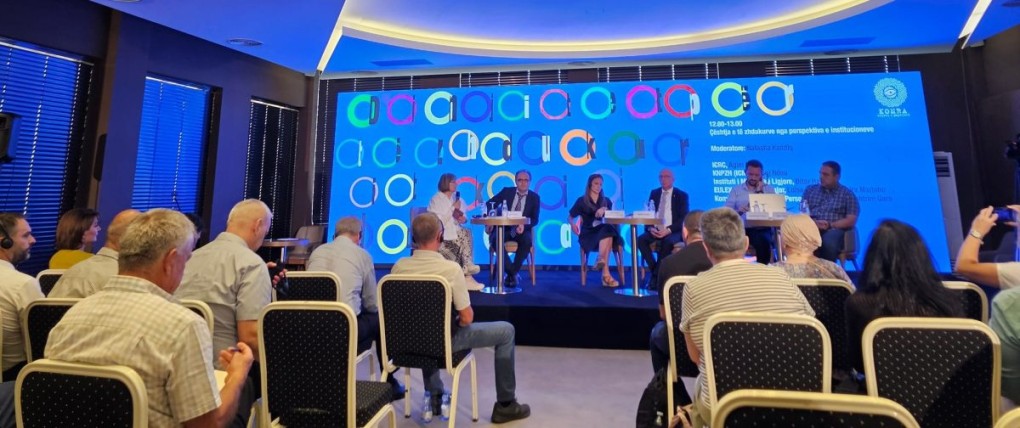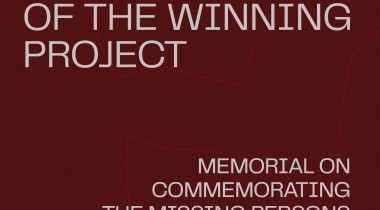The Humanitarian Law Center and Humanitarian Law Center Kosovo, as part of the REKOM Reconciliation Network, launched the ‘XVI Forum for Transitional Justice in Post-Yugoslav Countries’ at the Hotel International Prishtina on Saturday, which featured a series of panels and the official promotion of the second edition of the Kosovo Memory Book, ‘Dignity for the Missing’ (1998-2000).
The second edition of the Kosovo Memory Book (1998-2000) offers an insight into the diverse and painful circumstances of those who went missing during the conflict in the country, featuring individuals who were pulled out of their homes and out of their fields, taken out of refugee columns exiting the country, and feature disabled or incapacitated individuals and over 70 minors and over 200 individuals over the age of 70.
Blood samples to aid in DNA identification for have still not been secured for over 150 missing, and for over 50 there are insufficient blood samples. The International Committee of the Red Cross (ICRC) lists 1,613 missing in the conflict, while the Humanitarian Law Center lists an additional 23 missing, bringing the number up to 1636.
Of that number, 1,400 were civilians or uninvolved in any shape or form in the fighting, resistance or taking up of arms in the conflict.
The Kosovo Memory Book (1998-2000) was compiled by collecting over 2,000 statements, obtained with the explicit approval of the family members. This was combined by more than 1,500 additional reports, and cross-referenced with court documentation, open sources and the databases of the ICRC and the ICMP.
At the Forum, opening speeches were held the Special Representative of Norway for the Western Balkans, Ambassador Haakon Blankenborg and the European Union Special Representative for Kosovo Tomáš Szunyog.
Blankenborg highlighted that Western Balkan societies have to “challenge their comfort zones” and not use missing persons as “a political bargaining chip,”and that “impunity and uncertainty can never be the long-term solution.”
He also stressed that organizations such as the Humanitarian Law Center and the Humanitarian Law Center Kosovo have had to step in when governments stalled progress with “tactics and political assessments” for the most basic issues, including revealing the numbers and locations of missing persons.
Tomáš Szunyog applauded the transitional justice efforts of organizations such as the Humanitarian Law Center and the Humanitarian Law Center Kosovo in “helping victims and their families find closure.”
Their statements were followed by a keynote speech by former Kosovo President Atifete Jahjaga, who above all emphasized her support for the second edition of the Kosovo Memory Book (1998-2000) and expressed her appreciation for the family members of the missing who have come forward with their testimonies and who participated in the events of the Forum.
Former President Jahajga delivered a poignant speech about open wounds that continue to fester in Western Balkan societies due to the unresolved fate of missing persons, and emphasized the lack of “political will, especially on the side of Serbia, to collaborate on the review and exhumation of mass graves in Batajnica, Petrovo Selo and Perućac.”
“Justice is a precondition for a sustainable peace,” she highlighted.
Petrit Hasanaj was the first family member to speak, and shared the experience of losing family members in the Meja Massacre, which took place in April after the NATO bombing campaign was launched as a form of revenge on the Kosovo Albanian population. “I was a student, so I was in Prishtina while my family was in Meja.”
“My father told me not to come to Meja, said I should stay in the capital. I was confused that he didn’t want to see me… the next time I saw him was in a coffin. Staying in Prishtina made it possible for me to be here today,” continued Petrit.
Mejra Dautović says her kids never knew – or cared – about the ethnic background of their diverse friend group. “My Edna was raped and tortured for 60 days in Omarska. Edin in the ‘Bela Kuća’… after years of searching and testifying, I buried both my children.”
The Kosovo Memory Book is the only publication focused on the 1998-1999 conflict in country that provides an extensive compilation of testimonies of those missing or killed people during the conflict, featuring at least three unique testimonies and covering all ethnic groups affected by the fighting.
The second panel focused on what institutions were undertaking to resolve the issue of missing persons and what the challenges have been over the years. Luigj Ndou, from the International Commission on Missing Persons, says that the issue of missing persons is the “transgenerational curse that we are not healthy enough to break and move forward.”
In particular, panelists stressed the problem of mistakes made during identifications done by traditional or non-DNA means. Ditor Haliti from the Kosovo forensic institute highlighted that “many of the remains of unidentified [No Name] persons have been sent to the International Comission on Missing Persons but do not match any of the blood samples on file.”
Luisa Maria De Oliveira Marinho from the EU Rule of Law Mission (EULEX) in Kosovo forensic team said that despite misgivings “many traditional identifications were later confirmed to be correct based on DNA.” EULEX, she highlighted, was committed to reviewing cases of mistaken identifications in the past so that family members can achieve full closure.
The third panel tackled the international political angles of the Western Balkan transitional justice issue, with panelists ranging from actors affiliated with EU institutions to academics and analysts.
Kosovo Minister of Justice Albulena Haxhiu talked about the recently adopted strategy on transitional justice, stressing that “since I became minister, there was no other single document that was more complex and more complicated to put together.”
She also stressed that Kosovo “launched an initiative to prosecute war criminals in absentia, because Serbia refuses to release its war criminals and continues to harbor them,” comparing it to similar laws in other countries in the region such as Croatia.
Analyst Agon Maliqi said the region was trying to replicate the efforts of the West in post-World War II Germany, but that this was a false comparison. World War II, according to Maliqi, “ended with clear winner and clear perpetrator, who went through a deep soul-searching exercise, whereas we here continue to see revisionism and denialism.”
Eric Gordy, a professor at University College London and a Balkans expert, said the reason the process has not entirely taken root in the region is because it “occurred in relatively closed circles, international circles, with states outside the region or only some states in the region and rarely any civil society organizations – so society was cut out.”
The final event explored the efficacy of EU efforts on transitional justice and the issue of missing persons. Jelena Minic, a former diplomat and part of the Forum for International Relations of the European Movement in Serbia, said that a stoic and straightforward approach is needed. “We need to get to a point where we calmly and openly, without fanfare and flags, admit to all the crimes committed.”
Miodrag Milicevic, a member of Kosovo society from the NGO Aktiv reflected on the recent downturn in relations between the two. “We are in a cursed circle and no one can come up with a concrete model to get out of the slump in relations between Serbs and Albanians.”
The Forum will continue on Sunday with panels focusing on the results achieved by civil society actors in the sphere of transitional justice, as well as a closing panel on which Western Balkan experiences and how international humanitarian law could be translated to ongoing conflicts such at the fighting in Gaza.
Photo: Atifete Jahjaga Facebook Page


